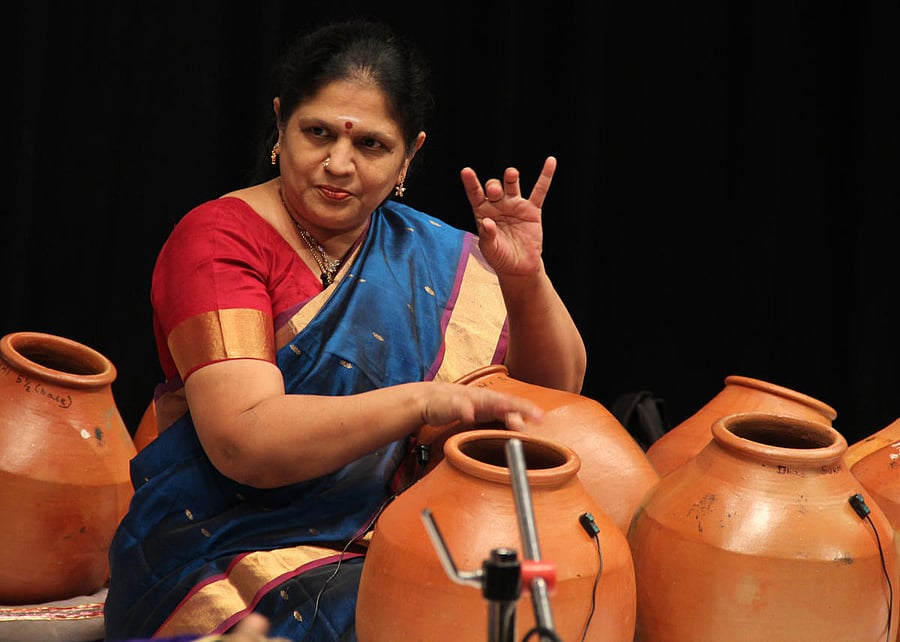
Meet Vidushi Sukanya Ramgopal. She’s the first woman ghatam player in Carnatic music. She sings as well as plays the violin, mridangam and veena. Her music training was from the illustrious family of legendary ghatam player, Vikku Vinayakram. In her eventful journey of more than 40 years, she has bagged several awards, including from the Sangeet Natak Akademi, the Karnataka Sangeeta Nritya Academy and the Madras Music Academy; has performed with legendary Carnatic musicians like Lalgudi Jayaraman, M Balamuralikrishna, Palghat R Raghu; written a book, Sunaadam: The Vikku Bani Of Ghatam Playing; launched the innovative Ghata Tarang; and leads an all-women instrumental group, Sthree Thaal Tharang. In an interview with DHoS, she shares some of her experiences. Excerpts
Looking back at your life, what stands out in your memory as the most satisfying moment?
At the All India Radio, when they provided opportunities for percussion, all artistes would play together, and generally, the mridangam players would get awarded. I wrote a letter to them that they shouldn’t club all the additional percussion instruments along with mridangam and that if a government-level organisation did this, no upcoming musicians would ever want to learn the ghatam or the kanjira. They responded by splitting the percussion categories into two.
In another incident, when I performed the Ghata Tarang with my guru at a mutt in a village, there were lakhs and lakhs of people who had come from the surrounding villages.
When I did the Konnakol, I said Siva, Siva, Siva and people clapped and repeated the words with me. Even today, when I mention this incident, I get goosebumps. At another performance in Abu Dhabi, where several dignitaries were present, I performed the Konnakol, and the audience joined in with the talam.
How supportive is your family? Are your children, and grandchildren into music?
My husband has been very supportive, and so has my mother-in-law, who would take over, when I was not at home. My sister-in-law calls me her role model. My sister Bhanumati was the one who told my parents that I ought to be trained in mridangam. However much you want to achieve, if people around you are not supportive, it’s difficult to do so.
Both my children — daughter and son learned the ghatam, but when they went to engineering colleges, they quit. They are now in the US. My grandson learns the piano and composes many pieces. My granddaughter is only two years old, but she recognises swaras.
How difficult was the creation of Ghata Tarang, where you play seven-eight ghatams?
It was very difficult to do, but I took it up as a challenge — to get notes from different ghatams is a divine blessing. In the beginning, I played with five, six, and seven and then went to eight ghatams. It’s difficult to take eight ghatams abroad, so I play only locally.
How did Sthree Thaal Tharang come into being? How many women musicians are now part of the ensemble?
I had been thinking of creating something different when the opportunity presented itself. There was a seminar at a Bengaluru centre for ghatam and kanjira and I played at their valedictory function. At a lecture demonstration in Chennai, people said it was not possible to perform a three-hour concert. Then I got together with other artistes — mridangam, violin, morsing, flute and ghatam and created an ensemble. Some 40 artistes have participated with me. We have performed in several places in India and abroad in the past 35 years.
Can you share any of your interesting experiences from your performances abroad?
There have been many memorable moments but some stand out. When I was in Abu Dhabi, I lost my luggage and till today I haven’t got it. I had ghatam mikes in there, which in those days cost Rs 6,000 — today they cost a lot more. I had bought a wooden instrument in Germany, which made different sounds. I lost that as well.
I am very proud that all my Ghata Tarang performances got standing ovations. People would come up to me and tell me that the sound of my ghatam was divine. I feel happy that God gave me this opportunity to make someone else happy with my music.